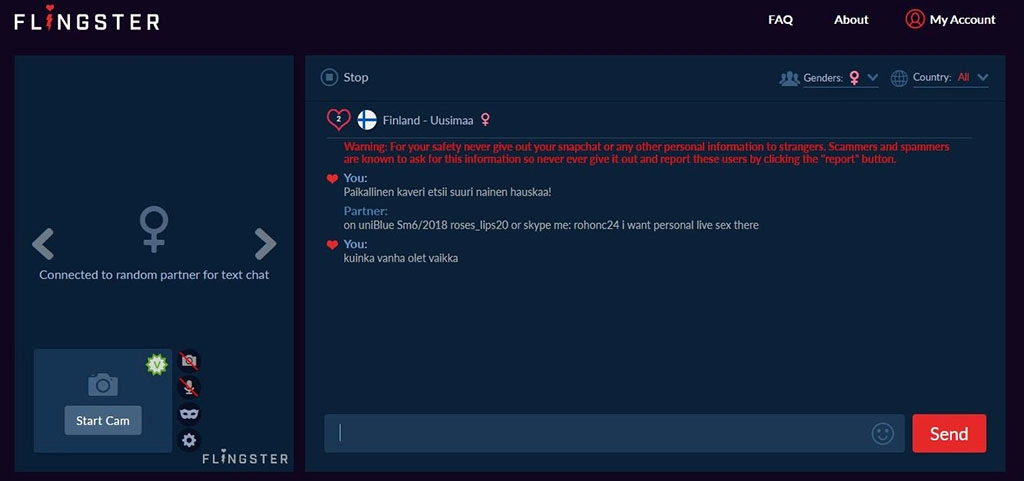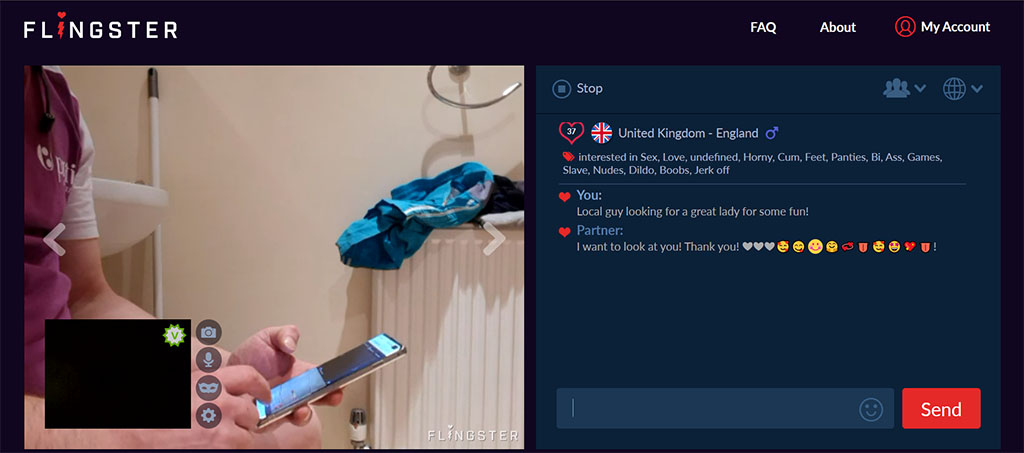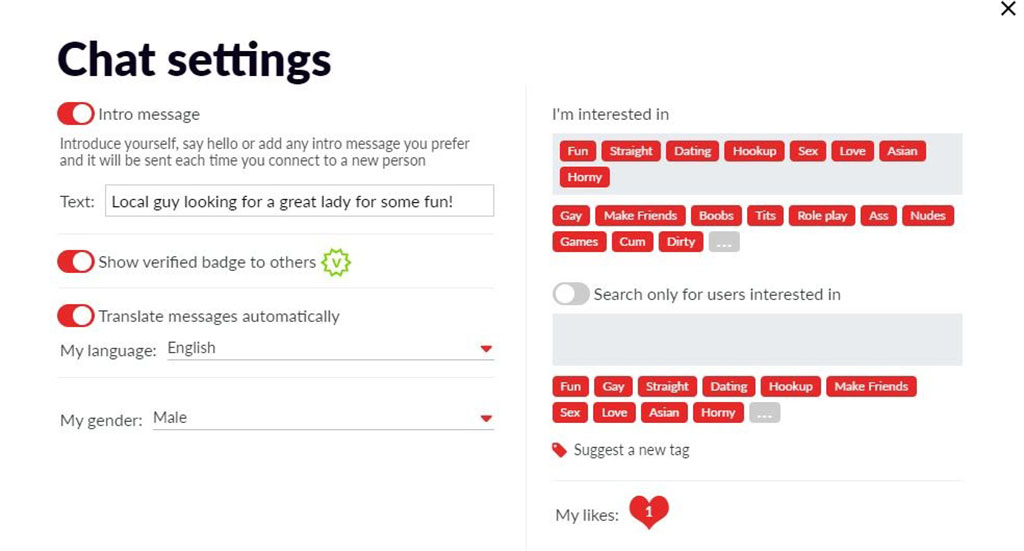When you purchase through links on our site, we may earn an affiliate commission. Here’s how it works.
Our Flingster Review for 2024: Should You Give It a Chance or Run?
So many hookup sites out there claim that you can find hookups in an instant when you use their platform. Sadly, it’s almost always a case of overpromising and under delivering. So is this the case with Flingster? Find our for sure in our Flingster review!
But before we jump to the review, we need to emphasize that there are three amazing dating sites we’ve tried that almost always work. Here are some options if you have a feeling (maybe a correct one?) that Flingster may be a waste of time:
Site Our Experience Our Rating Free Trial Link 
Experience Highlights Try AFF For Free 
Experience Highlights Try eHarmony 
Experience Highlights Try Passion
Most of the hook-up websites we test follow the traditional online dating model. Create a profile, find another profile you like and type them a message. But Flingster is different.
This is a random video chat website, where the main goal is to connect with someone over video. Most ‘connections’ on this website take place immediately via ‘cyber sex’ or, to describe it more accurately, two people masturbating into their webcams.
Research from the University of Brussels suggests these types of websites have “transformed the traditional forms of pornography”. Back in 2005, Pew Research suggested that 16% of internet users had viewed remote locations via webcam, but that figure is surely much larger thanks to websites like Flingster. Data from Forbes suggests that the popularity of these websites skyrocketed during the pandemic-induced lockdowns of 2020.
“People want companionship as much as they want sexual fulfillment right now,” said Max Bennet, vice president of new media at Stripchat when the lockdowns first kicked off. And it seems as if that’s still the case.
“It’s human nature to seek comfort and connection and [cam sites] provide a bit of a respite from the isolation we are all experiencing,” Bennet added.
If you’re searching for Flingster.com reviews, you most likely want to know how easy it is to match up with a sexy woman and get your rocks off together. Ideally, without scrolling through endless live streams of penises to find her.
I’m an online dating expert and I’ve put Flingster through its paces to give you the ultimate verdict on whether this website is worth your time and money.
Flingster first started getting popular in the early part of 2020 and that’s when we first took notice. We’re always looking for new and interesting dating and hookup apps to try. There are a lot of scam dating sites out there that take your money without offering anything in return so we like to take one for the team and then share what we find with our readers.
How I Reviewed Flingster And Why It Matters
I was keen to test Flingster’s premium service and give an official verdict on whether it’s worth your money. At this point, the Beyond Ages team and I have tried out over 100 different dating and hookup apps but we love finding new ones that help singles, especially guys, find great results.
It takes a lot of time and money to do a proper review but it’s the only way to get to the truth.
That’s what I aimed to do in my Flingster review, although this experience would be different being that Flingster is a random video chat website that doesn’t allow users to create profiles.
Nevertheless, as always, my goal would be to reach out to 50 women in my local area and try to make romantic connections. On top of that, I examined every corner of the site and tried out all the different features on offer.
Usually, I’d test to see how many women would agree to meet us in real life but Flingster randomly connects you to women all over the world which made this impossible.
We use the same set of opening lines and profile details when testing online dating websites, so we can give you a fair comparison to the best available hook-up apps and websites. Spending this much time and effort is the only way to get a real feel for the site and its value!
The Full Flingster Review Results
For those of you who aren’t interested in learning about every key detail of the Flingster.com experience, we have created a basic summary. The chart below ranks Flingster out of 10 for the elements we believe to be the most important aspects of online dating.
For context, we have compared it to AFF (which you can try for free), the hookup site where we’ve been seeing guys get the best results lately.
 |
 |
|
|---|---|---|
| Overall Our team rates each site objectively based on many hours of independent research, the features each site offers, and how it compares with other sites. The ratings are the opinion of our editors and their extensive experience. |
2 | 9.5 |
| Quality of Women Our opinion of how attractive the typical woman is that uses this site and how easy they are to connect with compared to other sites. |
1 | 9 |
| Popular How many people are using this site to actually meet people compared to other sites. |
2 | 9 |
| Usability How easy is this site to use and how quickly can an average person begin meeting people compared to other sites. |
7 | 10 |
| Privacy & Safety Does this site take proper precautions to safeguard its members, their identity, and their data. |
8 | 10 |
| Effective Our opinion of how easily an average person will be able to achieve their dating goals with this site compared to other sites. |
2 | 9 |
| Value Will the time and money spent using this site pay off for an average person based on the opinions and experience of our editors. |
2 | 10 |
The time I spent using Flingster was frustrating. I was unable to make a half-decent connection with anyone.
This leads me to question whether there are really over 2.7 million people who have signed up to the website, as Flingster claims.
Indeed, there were a few signs that some of the accounts I communicated with weren’t human at all.
Overall, compared to AFF, it looks pretty bad.
Flingster kept matching us with the same “women”
Once you’ve set up your account, the Flingster algorithm will automatically pair you with another user and you can start chatting, either by typing or via webcam.
With the free service, you aren’t able to filter what gender you’re paired with, so your experience will be frequently interrupted by images of men masturbating into their camera. You can imagine what the guy below is about to do.

The paid service eliminates this possibility. But the algorithm would appear to keep matching you with the same women over and over (names aren’t revealed, but location is).
This suggests there really aren’t many women using this website at all.
Could this be because sexcamming is seen as “morally questionable”, as the University of Brussels study suggests? Perhaps most of the women willing to perform naked for strangers are doing so on cam sites that pay them.
Either way, you shouldn’t expect to have many opportunities to connect with women on Flingster, based on my experience testing it.
I kept receiving the same messages
For the purposes of the review, II kept persisting with Flingster until we had sent messages to 50 different women.
Only 12 of them wrote back , and even then the conversations were typically very short before the women disconnected the chat. Keep in mind that the chat feature has an instant translation feature. However, I don’t know how accurate it is.

Almost all of these conversations would follow the same pattern. The women would ask my age, then to see my penis. When I tried to change the conversation, they would disconnect.
According to Beyond Ages dating coach Jennifer Greene, “If she’s got an online dating bio that is in clear English, then you might be in luck, but be prepared for the “I want to have sex tonight” fake bot message that may be coming your way.” This is exactly what I saw.
I only saw one woman on webcam (for about five seconds before she disconnected).
I can’t say for sure that some of these women were bots. I’ll lead to you to draw your own conclusions about that…
Either way, these were far from stimulating conversations and the odds of chatting with a woman on webcam are slim to none. You’re more likely to see videos of various men in different stages of undress, pixelated privates or some guy on the toilet:

Flingster also sends an automatic scam warning to users whenever you ask them for their contact details, which will surely make them wary about staying in touch with you outside of the website.
There’s next to no chance of meeting up on Flingster
Flingster connects you randomly with accounts around the world. With a premium account, you can filter by location. But you’ll be waiting a lot longer to connect with someone if you do. We were most frequently chatting with women in India, Panama and Saudi Arabia.
We tried to exchange phone numbers with women whenever we could. But they always denied our request. There is no way to reconnect with the same Flingster user twice unless you exchange contact details.
This alone makes us question why anyone would choose Flingster over a website like AFF, where you can chat with real women in your local area and consistently arrange no-strings hook-ups. Unlike Flingster, AFF actually gives you control over who you can chat with, and that gives you much better odds of actually getting laid.
Some 50% of online dating website users said they’ve been confronted by scam accounts, according to a Pew Research Study, and I can’t discount the possibility of this potentially happening on Flingster.
Almost 70,000 Americans fell victim to online romantic scams in 2022, according to the Federal Trade Commission, so it’s best to keep your wits about you.
The median reported loss of romance scams is about seven times higher than for other frauds,” says Emma Fletcher, who is a senior data researcher at the Federal Trade Commission.
The fleeting nature of connections on Flingster might make it harder for scammers to build the relationships needed to scam people out of their money. But it’s not impossible.
Realize that there are people out there who don’t care about you or your family,” says Merrill Oveson, information technology director at Utah Valley University.
“They are willing to do whatever they can to steal from you or harm your family.”
If you don’t want to go through all the trouble of snooping through their socials or asking them more detailed questions, there’s a tool you can use to know for sure that the person you’re talking to is who they say they are. It’s Instant Checkmate, a background-checking tool that can help you know more about people you find online–the legal and hassle-free way. All you need are a few of their details and Instant Checkmate will give you all the information you need to verify who you’re really talking to online.
Try out Instant Checkmate’s free trial and see just how easy it is to get all the info you need. Better safe than sorry!
Positives and negatives of Flingster
Despite our not-so-great experience with Flingster, there are a few positives that come with the negatives.
- User-friendly interface
- Choose between text chat, webcam or both
- Instant language translation
- There are definitely some real women
- There appears to be very few female users overall, and there were barely any in our location
- Some accounts communicated like bots, although I can’t say for sure
- Out of the 50 women we opened, only one used her webcam, and we had 0 meaningful conversations
Even if you’re happy to just chat with random people from around the world, with next to no chance of ever meeting them, we still wouldn’t recommend Flingster.
A well-regarded hook-up website like AFF has a much larger user base and allows you to use a range of filters to select who you actually want to connect with.
What’s more, in our experience, the majority of AFF users are keen to message back, meet up and get down to business.
Instead of waiting and waiting to hopefully take part in some virtual sexiness with a random stranger on Flingster, we recommend you arrange to meet your ideal woman on AFF and enjoy the real thing!
AFF is even currently offering a free trial, so there really is no reason not to give it a try.
Profiles, pictures, and members

When you’re paired with another Flingster member, you’ll always see their gender, location, bio and the amount of ‘hearts’ they’ve collected. Unless they turn on their webcam, there is no way of seeing what they look like, as there is no option to include a profile picture.
You can add a short bio on your profile. But none of the accounts we were paired with did so. Another sign that these aren’t real people…
You can also add tags (like boobs, ass, sex, nudes, straight, gay etc) to your profile to show others what you’re interested in.
It is possible to send a ‘heart’ to an account you enjoy chatting with. The amount of hearts collected will be displayed on their profile. In theory, this is a good way to show people the legitimacy of the accounts they’re communicating with, although we imagine it could be easily manipulated. We were only given one star out of the 50 women we communicated with.
The Flingster Alternatives Most Recommended By Dating Experts To Regular Guys
Normal guys that have been struggling to meet girls online are probably using the wrong apps. If you’re struggling that is the most common cause we see. For a little more context, here are the top three apps right now when it comes to casual fun for regular guys that actually want results:
| Site | Our Experience | Our Rating | Free Trial Link |
|---|---|---|---|
Best Hookup Site Right Now  | Experience Highlights
| 9.5 | Try AFF For Free |
Great If You're Handsome  | Tinder Highlights
| 8 | Try Tinder |
2nd Best For Most Guys  | Experience Highlights
| 8 | Try Passion |
Design
We actually like the simplicity of the Flingster.com design. You’ll see the webcam of the user you’re chatting with on the left of the screen and text chat on the right. In the top right of the screen, you can toggle which gender you want to be matched with.
Flingster.com appears to be a reasonably modern website, and the algorithm attempts to match you with another user as soon as you’re disconnected from the previous one. We can’t comment on the quality of the video streaming, as we were barely paired with anyone who turned it on.
Flingster works perfectly well on mobile, although there is no dedicated smartphone app.
Messaging and chatting

As soon as you create an account, you are taken to the chat service, where you are matched randomly to another user. Paid users can choose to filter who they’re paired with by gender and location. You can choose to communicate via text chat, webcam or both.
If you want to use your webcam but protect your anonymity, Flingster gives you the option to add a range of mask filters onto your face. Some of them are designed to be reasonably kinky.

You can message as soon as you are paired with another user. As soon as you’re disconnected, your chat disappears and the algorithm immediately pairs you with someone else. There’s no way to reconnect with the same user and your chat history is not saved into any sort of archive.

Flingster is essentially a one-on-one chat room, rather than an instant messaging service. Unlike traditional online dating websites, you won’t receive messages from other users unless you’re online.
There is no limit on the number of users you can connect with, nor the number of messages you can send.
We attempted to start text chat conversations with 50 female accounts and received responses from 12 of them. Most of these disconnected soon afterwards, and the lengthier conversations were suspiciously formulaic.
What can you do with a free membership?
Most of Flingster’s features are available with a free membership. The only paid features are the ability to filter who you’re paired with by gender and location.
However, Flingster is so overcrowded with men masturbating into their webcams that it arguably renders the free membership unbearable (although we don’t rate the paid membership very highly either).
Advertisements
If you have a free membership and no webcam, you’ll see ads in place of a webcam video from your match. The ads are reasonably suggestive, though they’re pretty tame.

We weren’t served any adverts with our paid membership, nor were we pestered by scammers or members trying to sell us anything.
Pricing
You can purchase a premium membership for:
one week: $6.99
one month: $19.99
six months: $89.94 ($14.99 per month)
This is cheaper than many of its competitors. But we couldn’t possibly suggest that Flingster provides any value for money.
Most Users Seem Unimpressed With Flingster
I perused other user reviews of Flingster after my tests were complete. Most people agreed that it wasn’t worth their time.
Haze5655 – Reddit
“Flingster=dead? I am looking for a woman (with premium). If I ever find anyone I can only find the same few members but it’s only videos or black screen. Am I the only one or does anyone else have this problem too?”
1realbig – Reddit
“If you are a male looking for females, having premium saves you from sitting 4-5 hours clicking next to a million dicks. Then after 5 hours you finally see a female, just to be skipped because you didn’t take your dick out fast enough. Who wanna sit with their dick out for 5 hours watching other dicks if you are straight?”
Substantial_Theory66 – Reddit
“I’ve been checking out flingster and similar apps for a few weeks now and even as a girl, it can be pretty hit or miss as to whether or not I’ll have a fun time.”
Flingster Review: Frequently Asked Questions
Not yet sure if Flingster is for you? Here are some FAQs for you:
What is Flingster?
Flingster is an instant adult video chatting app and site that lets you connect with random people anonymously. You can’t specify who you want to connect with; it’s all random.
Who actually owns Flingster?
Flingster is owned by Skyline Media LLC, a company registered in Wyoming, USA.
How can I contact Flingster?
You may contact Flingster via their contact form at https://flingster.com/contact/
Is Flingster real?
Yes, Flingster is a real site and app where you can meet plenty of strangers.
Is Flingster legit?
There is evidence suggesting that Flingster is not legit, although we don’t have concrete proof either way. Even so, we suggest you stay away from Flingster and opt for one of our recommended hook-up websites instead.
Is Flingster a scam or fake?
We wouldn’t call Flingster a scam. But we have no qualms about saying that its premium membership is not worth the money at all.
Is Flingster safe?
No, we’re not completely sure that Flingster is 100% safe. So use a VPN if you ever intend to use this site.
What are Flingster alternatives?
You discover the best alternatives to Flingster by visiting our guide to the best hookup apps and websites.
How does Flingster work?
When you create a Flingster account (which is free, by the way), you’re presented with a stream of other users you can chat with via text or video. You can’t choose who you get to chat with since it’s completely random.
How can you keep a woman’s attention on Flingster?
University of Brussels research acknowledges that it’s difficult to keep someone’s attention on sexual live streaming websites, even for the professionals.
To boost your odds of not being skipped, it’s a good idea to have good lighting and a background that’s not too off-putting. Turn your sound on and greet your match with enthusiasm. Ideally, you want to look as presentable as possible. If the camera is pointed at your junk, make that look as good as possible.
Why are random sex chat websites so popular?
This is a different form of pornography and intimacy that meets a unique need.
“Camming is growing because it’s live,” explained Rickey Ray, assistant manager of webcam studio franchise Studio 20.
Indeed, Flingster and similar websites present a tempting hybrid of real-life interaction and internet pornoography.
“There’s a real-life relationship with that person that you’re not going to get from someone watching a video,” Ray added.
Danika Maia, founder of cam girl agency Money Mama Club agreed that it’s not just the sexual element that people enjoy.
Instead, she insisted: “[It’s] basically about talking and having friendly interactions with people.”
This can be a vital public service, especially for those who struggle to find companionship through traditional online dating. Some 33% of adults have experienced loneliness at some point in their life, according to a worldwide Statista survey. Meanwhile, a Health Resources and Services Administration study recently found that severe loneliness can damage your health as much as smoking 15 cigarettes a day.
“You talk a lot and get to know people. I hear about a lot of people’s social problems,” Maia added.
Is there a Flingster app?
There used to be a Flingster app, but it looks like it’s no longer available.
How much does Flingster cost?
You can create a free account, or pay for a premium account. You can pay weekly ($6.99), monthly ($19.99) or for six months ($14.99 per month).
How can you use Flingster for free?
Yes, Flingster is completely free to use. Just create an account and you can start chatting.
Can you send messages for free on Flingster?
Yes, you can send messages and turn on your webcam with a free Flingster account.
How do you cancel your Flingster membership?
Once you’re logged in, click “My Account” in the top right-hand corner of the screen. From the menu that pops up, navigate to “Membership Status,” click “Details” then click the “Cancel Membership” button that appears.
How do you delete your Flingster account?
Once you’re logged in, click “My Account” in the top right-hand corner of the screen. From the menu that pops up, click the “Delete My Account” button which appears underneath your email address.
More reviews worth reading
If you found this review useful check out these other hookup sites:
Cheating Hookup Review
I Want U Review
Flirt Review
Passion Review
XMatch Review
References:
Anderson, A., Vogels, E., Turner, E. (2020, February 6). The virtues and downsides of online dating. Pew Research Center.
Barrett-Ibarria, S. (2020, January 14). Cam girl: Webcamming in the porn industry. The Guardian.
Brasseur, P. (2020) Performing amateurism: A study of camgirls’ work. Research Gate.
Cookney, F. (2020, March 31). People look to cam sites for sexy interaction in self-isolation, but is there money to be made? Forbes.
Fletcher, E. (2023, February). Romance scammers’ favorite lies exposed. Federal Trade Commission.
Mikhail. A. (2023, June 15). Loneliness comparable to smoking up to 15 cigarettes a day. Fortune.
Rainie, L. (2005, June 20). Use of web cams. Pew Research Center.
Rosenzweig, M. (2020, November 1). Loneliness business booming pandemic. The Guardian.
Statista. (n.d.). Loneliness among adults by country.





